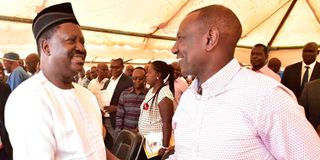Learn to share political carcass

What you need to know:
- In Kenya’s victor-hog-all politics, effectively half the country would be locked out of power at the national level in the next five years.
- Kenya, though, is a country where politicians like to eat fat toads, so reserving speakerships for the losing parties might not cut it.
- Perhaps a constitutional reform could provide for a Prime Minister elected by both Houses—but not from the party of the President.
The presidential election of August 9 in Kenya has ended up in the Supreme Court, where the runner-up, former premier Raila Odinga of the Azimio la Umoja One Kenya Coalition Party, is challenging the declaration of Deputy President William Ruto of Kenya Kwanza Alliance as the victor.
The Day One voting went unusually well and was transparent in ways that kept East Africa and several other places on the continent and the world open-mouthed with wonder.
Then the old last-mile issues, after the voters have left the polling stations, set in and now the judges will have to settle it once again.
However, even as Kenyans continue to rage over the outcome, outside the poll dispute is a novelty.
Although Dr Ruto is the DP, following his fall-out with President Uhuru Kenyatta and the latter’s alliance and backing of Mr Odinga, he went into the election as the opposition.
If it turned out that Kenya Kwanza fiddled the vote, it would easily be the first time the opposition stole the presidency.
Several outsiders think it’s unlikely. In Africa, the opposition doesn’t get to rig the vote (unless the exiting incumbent does it for them, as Joseph Kabila did for Félix Tshisekedi in DR Congo in 2019); it is the one that is robbed.
Others, however, see some hope in it, arguing that rigging is righteous when an oppressed opposition uses it to take power from a dominant abusive ruling party.
This picture of Kenya as an equal-vote-stealing opportunity country is as fascinating as that of it as an over-the-top transparent Day One voting nation.
Kenya, though, wasn’t the first African nation to hold such a transparent vote.
The honour belongs to a country whose politics is often as messy as Kenya’s—Nigeria.
The Nigerian federal state of Osun held an election for governor on July 16.
The candidate of the ruling All Progressives Congress (UPC), of President Muhammadu Buhari, was trounced by the opposition Peoples Democratic Party (PDP) flagbearer.
The popular view in sections of the Nigerian media was that APC was unable to rig because the tally was done electronically and live.
All parties, including civil society, foreign embassies and others who wanted had their interfaces built directly into the election commission servers so they could monitor live and copy to their own servers, going a step further than Kenya did.
But old habits die hard, with allegations of widespread vote buying.
In a first, anti-corruption officials were deployed to polling stations, and mobile phones were banned in the booth.
Apparently, it is not uncommon for an M-Pesa payment to land on a voter’s phone after she has picked up the ballot paper and is about to tick her candidate, causing her to make a surprise last-minute change of heart.
A good and bad thing
Despite missteps, these election transparency reforms have made for very close votes in countries like Nigeria and Kenya. It is both a good and bad thing.
Consider what happens in an election where the winner gets 88 per cent of the vote, the runner-up 10 per cent, and the rest share the remaining two per cent.
Where the winner takes all, the losers who will be locked out for the next five years are just 12 per cent.
Ruto was declared the winner with 50.49 per cent of the vote and Raila took in 48.8 per cent.
In Kenya’s victor-hog-all politics, effectively half the country would be locked out of power at the national level in the next five years.
The combination of the Constitution and court-driven electoral reforms in Kenya has, in many ways, succeeded to a level where they are becoming politically untenable.
The solution to this has been “handshake” and “nusu mkate” (half a loaf of bread) political deals and national unity government arrangements made in the shadow of post-election crises.
It is a start, but a poor one. The changes need to be entrenched in the Constitution and election ritual.
There are some basic models around. In Rwanda, by law, the Speakers of the National Assembly and the Senate cannot be from the ruling Rwanda Patriotic Front and its affiliate parties.
They are elected from other parties with members in the House. The discussion of which Kenya Kwanza luminary will become the Speaker of the Senate that we are hearing wouldn’t arise. Even the One Kenya Alliance wouldn’t get it.
Kenya, though, is a country where politicians like to eat fat toads, so reserving speakerships for the losing parties might not cut it.
A bigger job would have to come into play. Some ideas emerged from the Building Bridges Initiative (BBI) but its champions overplayed their hand and the Court of Appeal impaled it on a stake.
Perhaps a constitutional reform could provide for a Prime Minister elected by both Houses—but not from the party of the President.
Without that, computers tallying votes in Kenya will continue to be weird, and the Supreme Court will have to contend with lorryfuls of election petition papers for a long time to come.
Mr Onyango-Obbo is a journalist, writer and curator of the “Wall of Great Africans”. @cobbo3





